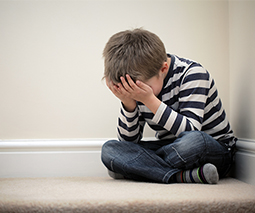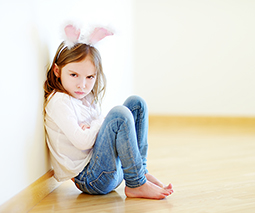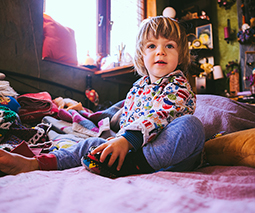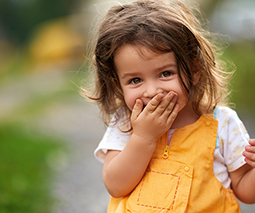“I said NO!” 8 ways to yell less and still retain your parenting power

I lost my voice last week and made a shameful discovery.
I discovered I’m a yeller. That I raise my voice in order to get my kids to do anything (“FLUSH THE LOO!”) and as a result, I’m powerless to parent without it.
In the week that my Mum Roar turned into a squeak as scary as a pet mouse, my boys pushed all of my buttons. There was flour everywhere because they’d gotten into the pantry, water all over the bathroom floor because they couldn’t hear me screaming at them to “STOP SPLASHING,” a week of lateness as I couldn’t bark at my four-year-old to “GET DRESSED” and me chasing them around the house when ordinarily I would just holler at them to do this or stop doing that.
I had my cranky mum pants on but not my cranky commanding voice. It had abandoned me and as such, I was forced to take a good hard look at the mother I’ve become. And I didn’t like her. I never wanted to be a yeller. I was ashamed.
So I read up on what do to and here’s what I learnt.
Yelling is the new smacking
In a parenting age when smacking has been removed from the list of discipline options (for good reason), I know I’m not alone in disciplining my kids with my scary loud voice, or using it just to get them to tune in – “PUT ON YOUR UNDIES. STOP THAT NOW AND PUT. ON. YOUR. UNDIES!” – But here’s the thing. Yelling scares little ones and I don’t know about you, but I don’t like myself much when I resort to doing it. It puts me in a bad mood and I feel like I’ve lost control. What’s more, it can work against us over time.
Even my eldest made me see it when a little while back he said, “Mummy, that’s not a nice way to talk.” And he was right but damn it, he was driving me bonkers!
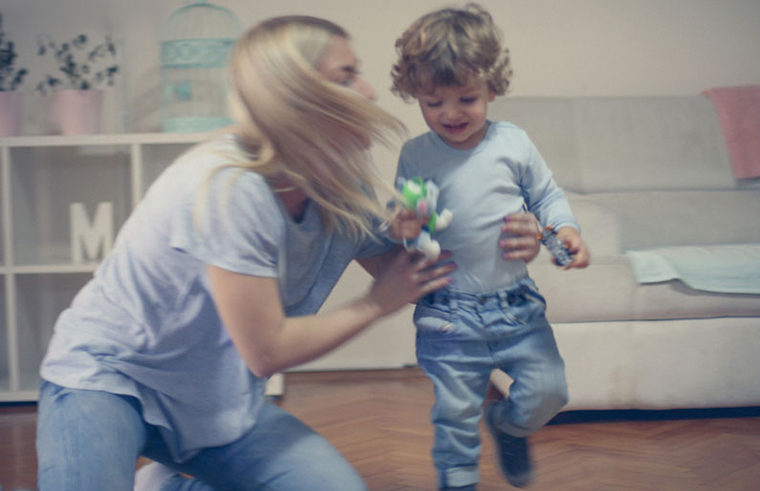
It trains kids to only listen when we yell
I know yelling is often the only way I can get my easily distracted four-year-old to listen. It’s my go-to when I’m exasperated. When whatever I’ve asked falls on deaf ears.
But maybe this is because my eldest and soon his little brother (I fear) are learning they don’t have to listen to me until I raise my voice. Maybe by yelling I’m teaching them it’s OK to tune me out until I lose it? And maybe (oh the shame) I’m teaching them to yell too. Cue, the mum guilt.
The more we yell, the less power it has
Oh and the other thing I’ve been reading, is that the more our kids hear us yell, the less effect it has on them. I guess it’s like crying wolf. If our child yelps for help every time they can’t find their favourite toy, then we’re less likely to run to them in a panic when they are actually in strife.
Likewise, we want yelling to have some power when we really need it, like when we scream “STOP” when our little one is making a dash for the road, or is about to pick up a sharp pair of scissors.
So if your little one isn’t afraid when you get angry and scream, it’s an indication that he’s seen too much of it and it’s lost its power. Humph.

How to yell less
This is all well and good to know but might make us all feel a bit crap *puts hand up*, so how can we actually parent with power without resorting to screaming? Here are some tips I found and have been trying out. I’m happy to report my household is a hell of a lot calmer and I’m also a much more chilled mum.
1. Just stop
If you can feel a stress-induced yelling explosion erupting inside you. Just stop. Don’t speak or make any rash decisions or threats. Try to breathe and calm yourself. If you’re already yelling, just stop in mid-sentence. Then walk away, shake your hands and resist the urge to get your kid to toe the line. Then when you’re calmer, take action.
2. Lower your voice
Remember how everyone tuned into boss lady Miranda Priestly whenever she’d talk in a low whisper in The Devil Wears Prada? When your kids have to strain to hear what you have to say, they will be forced to listen.
3. Use a visual schedule
So much of my nagging and yelling has been around getting my kids ready in the morning. I’ve addressed this and have started using a ‘visual schedule’ – which is just a drawing of all the steps they need to do, such as – eat breakfast (drawing of a bowl of cereal), get dressed (drawing of a stick figure with clothes), brush teeth, put on shoes, go to the loo and so on. They love knowing what they need to do and crossing each thing off as they do it.
4. Use consequences
For little ones, distraction is your best tool for diverting them from bad behaviour but for older preschoolers, we need to dish out consequences and stick to them. Rather than yell and scream when my boys defy me or are naughty, I’ve gotten better at dishing out consequences for their bad behaviour – and sticking to them. They know now that if I say (in a normal speaking voice) they’ve lost dessert or the playground, that I mean it.
5. Use an egg timer
If you’re in the habit of raising your voice to make your kids get dressed or to clean up, try the timer trick. Even if you don’t own an egg timer, use the microwave and watch as your little ones enjoy racing against the clock to get things done.
6. Connect first
This is a hard one, but try to see things from your child’s perspective and have empathy for him as you’re setting limits. When he feels understood, he’s more able to hear you out. Connect, then correct. This means talking to your child about his behaviour once he’s calmed down.
7. Take some time out
Sometimes the best thing to do is to just leave the room when the kids have really gotten to us. Of course this is hard to do with little ones, but even if it’s just going to the bathroom and splashing some water on your face, it might be enough to shift your focus and defuse some anger.
8. Reduce triggers
Take steps to reduce your yelling triggers by making sure your little mischief makers can’t get into anything they shouldn’t. This means adding those toddler-proof latches and keeping the things you don’t want them to touch out of arm’s reach. Also, respect your little one’s need for sleep because as I’ve found out the hard way, much of my mum stress (and consequently yelling) can be reduced when they aren’t melting down on me.

